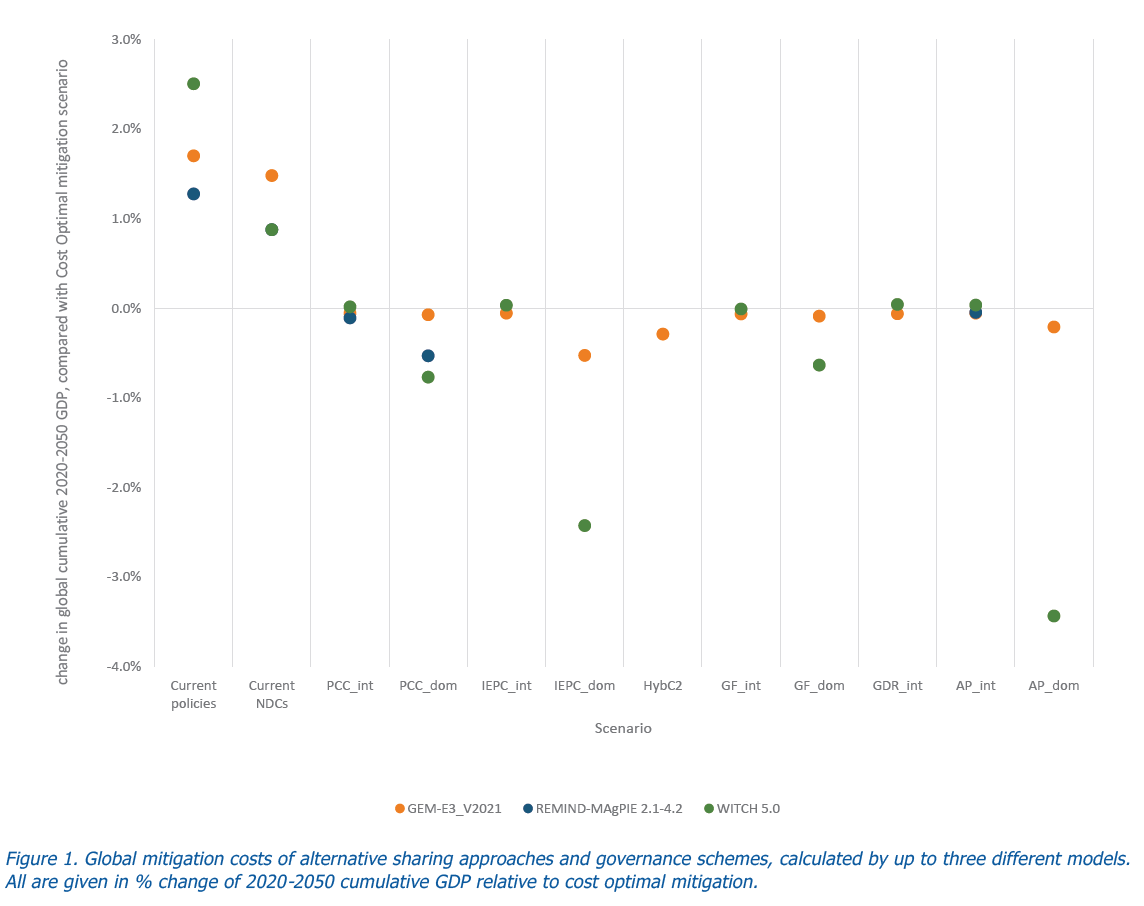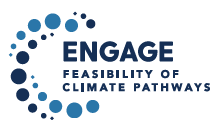
Policy Brief #35, October 2022. Sharing mitigation fairly between countries doesn’t have to be expensive.
Meeting the Paris climate goals will require a huge mitigation effort. To find out how and where it might happen, scenarios are usually designed to minimize global economic cost. This approach however assigns most of the effort to developing nations, which have the least resources to deploy carbon cuts, and the least responsibility for past emissions.
Instead, the world must find a way to share the effort fairly between nations by considering ethical principles such as ability to pay. Otherwise, there is little hope for the robust global cooperation required.
The Exploring National and Global Actions to Reduce Greenhouse Gas Emissions (ENGAGE) Project is exploring various effort-sharing schemes, based on a range of ethical principles.
So far, model results show that:
- Fairness is affordable. Most effort-sharing schemes lead to only a very slight reduction in 2050 global GDP (well under 1% compared with cost-optimal scenarios).
- Fairness-based emissions trading can cut costs further. However, the scale of international transfers may make this unfeasible.
- A climate club can bring the best of both worlds. If a large enough group of willing nations makes extra effort, then the world can achieve low-cost, fair mitigation with limited financial transfers.
- Developing nations are likely to benefit from any of these approaches. India, Indonesia, Mexico, South Africa, and Thailand face lower mitigation effort in all these ethics-based schemes than in cost-optimal scenarios.
- We still need to do more in the short term. In all effort-sharing schemes explored so far, countries need to increase their nationally determined contributions in order to meet the Paris goals.
Effort-sharing schemes have been discussed for decades. Is there a fair, affordable and feasible way to share the burden of mitigation? The ENGAGE project is analyzing different approaches to effort sharing. National and global teams are using integrated assessment models to assess emission and cost implications for the world and for individual countries.
Ethical range
Each sharing approach in the study reflects one or more ethical principles, such as equality, responsibility for past emissions, and capacity to deliver mitigation.
Modeled approaches are:
- Ability to pay (AP) – mitigation depends on per-capita GDP
- Immediate Emissions Per Capita (IEPC) – emissions per person are equal
- Per-capita convergence (PCC) – emissions per person converge to the same level by 2050
- Grandfathering (GF) – future national emissions are in proportion to historical emissions1
- Greenhouse Development Rights (GDR) – a formula that includes past emissions, GDP per capita, and income distribution, reflecting both responsibility and ability to deliver
Each of these approaches is first modeled in a domestic scenario, assuming that each country must physically carry out its allocated mitigation. It is then examined again in an international scenario, where wealthy countries can pay developing nations to mitigate on their behalf (when it is cheaper to do so).
Two more scenarios foresee a hybrid world: one group of countries choose low-effort options, while the rest form a climate club to take ambitious action.
For comparison, the models also generate scenarios to reflect current policies, current nationally determined contributions (NDCs), and cost optimal mitigation. To meet the Paris goal, all scenarios stick to a strict global emissions pathway2 projected to limit peak warming to about 1.7°C.
Low costs
Economic costs are measured by their effect on cumulative global GDP between 2020 and 2050.
Among the domestic scenarios, PCC is shown to be affordable by all models. Compared with cost-optimal mitigation, it reduces GDP by less than 1%.
The costs of IEPC and AP are less clear. One model projects low costs, similar to PCC; another projects substantial costs of a few % of GDP.
GF has similar costs to PCC, but is ethically questionable, favoring countries that have been heavy emitters in the past. The models could not make GDR work at all, as it requires unfeasibly rapid emission reductions in developed countries (reaching negative emissions early in 2030).
When international emissions trading is allowed, the impact on GDP is close to zero, with mitigation mostly taking place in the lowest-cost locations. The problem is that this requires huge international payments, amounting to several hundred billion dollars per year. Developed countries may be unwilling to transfer so much capital, and reluctant to rely on other countries to fulfil climate commitments for them.
 © ENGAGE
© ENGAGE
Join the club
If global emissions trading proves unfeasible, a hybrid approach could be the answer: many countries go their own way, and a climate club of willing nations makes up the difference.
ENGAGE has modeled this with two hybrid scenarios. These assume that nations outside the climate club make a least-effort contribution (choosing their lowest contribution from among the five ethical approaches modeled here under the _dom governance scheme). Then the climate club commits to closing the emissions gap to the global NPi2020_800 emissions pathway. To achieve cost-optimal mitigation within the club, emissions are traded with a common carbon price. Financial transfers are much lower than in the global emissions trading scenarios.
This can work well, if the club is large enough. In one scenario, the club includes countries committed to net zero in 2050 (as stated by December 2021), amounting to 40% of current global greenhouse gas emissions. Models were unable to make this work, requiring emissions cuts among club members that are too steep to be technically feasible.
The second hybrid scenario expands the club to countries committed to net zero by 2060, amounting to 75% of current emissions. This is much more effective, and able to meet the 1.7°C pathway with very little impact on GDP. However, only one model has reported results for this scenario as yet, so more work is needed to test this conclusion.
Reasonable demands
The study also looked at effects on individual countries, confirming that effort-sharing reduces the unfair burden on developing countries. In all the schemes considered here, Brazil, India, Indonesia, and South Africa need to deliver less ambitious emission reductions than in the global costoptimal scenario.
Even so, both developing and developed nations need to increase their climate ambition. In all countries, every effort-sharing scheme requires faster cuts this decade than existing NDCs.
As long as that can be achieved, this work shows that fairness-based approaches to mitigation can reduce effort for developing nations without high economic costs. This should help to get all nations onboard, making the transition to a zero-carbon world both more feasible and more just.
1 While this principle is not ethical in the usual sense of the word, it is considered here because it has been adopted by several emissions trading schemes.
2 The specific pathway, developed within the ENGAGE project, meets a total emissions budget of 800 Gt CO2e (800 billion tonnes of carbon dioxide equivalent), using rapid early mitigation rather than relying on negative emissions later in the century. Riahi, K., Bertram, C., Huppmann, D. et al. (2021). Cost and attainability of meeting stringent climate targets without overshoot. Nature Climate Change 11, 1063–1069.
Publications on which this policy brief is based
The research behind this brief was led by Zoi Vrontisi and Dimitris Fragkiadakis at E3M Modelling and informed a report that was delivered to the European Commission in September 2022. Results will then be published in open-source academic papers.
 © Wikipedia
© Wikipedia
This project has received funding from the European Union’s Horizon 2020 research and innovation programme under grant agreement No 821471 (ENGAGE).
 © IIASA
© IIASA
IIASA Policy Briefs report on research carried out at IIASA and have received only limited review. Views or opinions expressed herein do not necessarily represent those of the institute, its National Member Organizations, or other organizations supporting the work.

